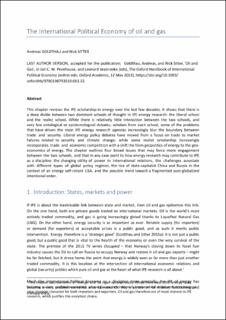The International Political Economy of oil and gas
Original version
10.1093/oxfordhb/9780198793519.013.32,Abstract
This chapter reviews the International Political Economy (IPE) scholarship in energy over the last few decades. It shows that there is a deep divide between two dominant schools of thought in IPE energy research: the liberal school and the realist school. While there is relatively little interaction between the two schools, and very few ontological or epistemological debates, some of the problems that have driven the main IPE energy research agendas increasingly blur the boundary between trade and security. Liberal energy policy debates have moved from a focus on trade to market failures related to security and climate change, while some realist scholarship increasingly incorporates trade and economic competition thanks to a shift from the geopolitics of energy to the geoeconomics of energy. The chapter outlines four broad issues that may force more engagement between the two schools, and that in any case point to how energy research may contribute to IPE as a discipline: the changing utility of power in international relations, the challenges associated with different types of global policy regimes, the rise of state-capitalist China and Russia in the context of an energy self-reliant US, and the possible trend toward a fragmented post-globalized intentional order.
